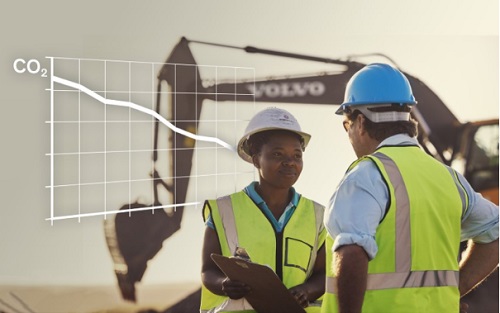As construction contractors and quarry operators in the Gulf face increasing pressure to mitigate the impacts of fuel prices and emissions on both their bottom line and the environment, Volvo Construction Equipment is building on the inherent fuel efficiency of its machines with tailored CO 2 reduction programmes. Ilkay Fidan, Commercial Manager for Market Area Middle East at Volvo Construction Equipment explains the reasoning behind this consultative and collaborative approach.
Volvo Construction Equipment (Volvo CE) has a strong reputation for producing among the most fuel-efficient machines on the market. Our wheel loaders, for example, incorporate a remarkable blend of advanced engine technology, optimal powertrain configuration, Optishift, enhanced cooling systems, intelligent load-sensing hydraulics, Eco-pedal system and auto engine shutdown. This winning combination maximises performance while minimising energy losses and fuel consumption.
Nevertheless, we recognise that more can be done in collaboration with our authorised Volvo dealers to help customers get the best out of their machines. This entails minimising the total cost of ownership and operation (TCO), while reducing environmental impact – an endeavour that is becoming increasingly important in the Gulf.
Fuel expenses constitute a significant portion of operating costs, particularly when machinery operates over long shifts or runs almost continuously to meet strict project deadlines or production targets. Although the Gulf region has historically benefited from lower diesel prices than other parts of the world, the pressure on construction contractors and quarry operators has increased.
High global post-pandemic demand, economic uncertainty, and the rise in global crude oil prices resulting from the Russia-Ukraine conflict have led to fuel costs becoming a growing concern. This is especially the case in UAE, where diesel prices have become higher than in other Gulf nations since deregulation in 2015.
Governmental push for lower emissions
Moreover, Gulf governments are exerting greater pressure on those in the construction industry to reduce energy consumption for the sake of the environment. For instance, the UAE Cabinet’s approval of the National Building Regulations and Standards at the end of 2022 mandates carbon footprint reduction, while the “We The UAE 2031” national plan supports the country’s aspirations to be a champion for carbon reduction and neutrality.
Similarly, the Saudi Green Initiative, aligned with Saudi Arabia’s Vision 2030, and Qatar’s National Climate Change Action Plan both set national targets to reduce and avoid greenhouse emissions within the next seven years. Machine data enables Volvo CE to monitor fuel consumption improvements throughout a CO 2 production programme.
Tailored programmes for CO 2 reduction
At Volvo CE, we believe that we have enormous potential to help our customers contribute to these targets by acting as more than a machinery manufacturer, rather a long-term solutions partner. Our CO 2 reduction programmes can encompass a range of possibilities, including as digital services like Fuel Efficiency Reports enabled by Volvo CareTrack telematics, training programmes such as EcoOperator, or consultancy services such as Volvo Site Simulation, which recommends the optimal fleet set-up and driving routes to minimise fuel consumption and emissions.
Regardless of the solution, we and our dealers follow a four-step process – Insight, Analyse, Improve, and Sustain – to identify areas for improvement, implement initiatives for fuel and emissions savings, and continually measure and enhance performance.
The advantage of this approach is its tailored nature, designed to align with specific customer requirements and budget considerations. If a ready-made solution is not available, it also presents an opportunity for us to collaborate with customers and develop custom solutions.
Our longstanding commitment
Environmental care has been a core Volvo brand value since the early 1970s. As expressed by our former CEO, Pehr G. Gyllenhammar, at the UN’s Environmental Protection Conference in 1972, “We are part of the problem, and therefore we must be part of the solution.” We are fully committed to reducing our carbon footprint as a manufacturer and working hand in hand with our





























